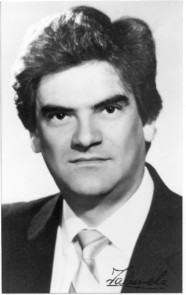Behavior Analysis in Colombia
Note from the Institute: This is the second in our series on the status of behavior analysis in countries around the world. Our observer is Andres Garcia-Penagos, who currently is completing his Ph.D. in behavior analysis at the University of Tennessee. Andres received his bachelor's degree in Colombia before coming to the United States for graduate study. On completing his degree, he will be one of the growing cadre of Colombians he describes in his commentary who are being trained at universities in other countries thereafter to return to Colombia to contribute to the growth and practice of behavior analysis there.
 Unlike the energetic reception that it had in the United States, Wilhelm Wundt’s founding of the first psychological laboratory in 1879 had little influence in Latin America, where only a handful of experimental psychology laboratories were founded between 1890 and 1920. This was even more the case in Colombia, where psychology didn’t appear as an independent field of study until 1947. The beginnings of psychology in Colombia were deeply influenced by the French psychological tradition, and thus had a clinical emphasis and a particular interest in psychological testing, which is arguably the dominant approach even today.
Unlike the energetic reception that it had in the United States, Wilhelm Wundt’s founding of the first psychological laboratory in 1879 had little influence in Latin America, where only a handful of experimental psychology laboratories were founded between 1890 and 1920. This was even more the case in Colombia, where psychology didn’t appear as an independent field of study until 1947. The beginnings of psychology in Colombia were deeply influenced by the French psychological tradition, and thus had a clinical emphasis and a particular interest in psychological testing, which is arguably the dominant approach even today.
 As a consequence, American psychology was virtually unknown, and little experimental research was conducted. This changed in the 1970s with the return of Rubén Ardila to the
As a consequence, American psychology was virtually unknown, and little experimental research was conducted. This changed in the 1970s with the return of Rubén Ardila to the  country after completing his doctoral studies at the University of Nebraska. Ardila heralded behavioral psychology, and his approach generated a lot of enthusiasm for its theoretical coherence, methodological advances, and its variety of applied possibilities in both assessment and intervention. Ardila published the first studies in operant conditioning, and was the founder of the Latin American Journal of Psychology, where most of this research is still published. Ardila was also founder of the Latin American Association for Behavior Modification, which started the promotion of applied behavior analysis in the 1970s.
country after completing his doctoral studies at the University of Nebraska. Ardila heralded behavioral psychology, and his approach generated a lot of enthusiasm for its theoretical coherence, methodological advances, and its variety of applied possibilities in both assessment and intervention. Ardila published the first studies in operant conditioning, and was the founder of the Latin American Journal of Psychology, where most of this research is still published. Ardila was also founder of the Latin American Association for Behavior Modification, which started the promotion of applied behavior analysis in the 1970s.
Not surprisingly, the analysis of behavior has been at the forefront of the theoretical and experimental debate in academic psychology in Colombia, a position that it still holds, although it lost influence in applied fields due to the rise of cognitive-behavioral therapy and other meditational approaches. Despite this, the interest in behavior analysis brought about  scholarly visits by well-known behavior analysts, which culminated in the establishment of the Colombian Association for the Advancement of Behavioral Sciences (ABA Colombia) in 1999. This organization has promoted the experimental and applied analysis of behavior ever since by hosting conferences and academic seminars and workshops, and is currently involved in debates with policy-makers regarding the delivery of ABA treatment for autism, and its coverage by healthcare providers.
scholarly visits by well-known behavior analysts, which culminated in the establishment of the Colombian Association for the Advancement of Behavioral Sciences (ABA Colombia) in 1999. This organization has promoted the experimental and applied analysis of behavior ever since by hosting conferences and academic seminars and workshops, and is currently involved in debates with policy-makers regarding the delivery of ABA treatment for autism, and its coverage by healthcare providers.
Behavioral research is active in an important number of academic departments throughout the country, although it probably should be more precisely called behaviorally-oriented than behavior-analytic. A number of labs are working in basic animal research, but only a couple do traditional operant research with schedules of reinforcement. Human research has increased in popularity and visibility. Also, a number of research labs are devoted to issues of choice, rule-governed behavior, and particularly stimulus equivalence and derived relations, although some are more akin theoretically to interbehaviorism, than to traditional approaches in behavior analysis. Other lines of research are certainly influenced by behavior-analytic approaches, but are devoted to non-traditional issues like consumer psychology and neuroscience.
 The recent return to the country of a number of psychologists educated in behavioral doctoral programs in the United States, Canada, Brazil, and Mexico is a sign that a return to more main-stream behavior analysis might become more prevalent in the coming years, despite limited funding, heavy teaching loads, and insufficient economic and work incentives that negatively affect the conduct of research in Colombia. Fields of application other than autism, like substance use treatment or OBM, are relatively unknown and their development has been delayed by the lack of effective international academic collaboration and exchange. Behavior analysis has been growing slowly but effectively in Colombia, but fruits of this growing remain to be seen in terms of international impact. Hopefully, this will be the case in the coming years.
The recent return to the country of a number of psychologists educated in behavioral doctoral programs in the United States, Canada, Brazil, and Mexico is a sign that a return to more main-stream behavior analysis might become more prevalent in the coming years, despite limited funding, heavy teaching loads, and insufficient economic and work incentives that negatively affect the conduct of research in Colombia. Fields of application other than autism, like substance use treatment or OBM, are relatively unknown and their development has been delayed by the lack of effective international academic collaboration and exchange. Behavior analysis has been growing slowly but effectively in Colombia, but fruits of this growing remain to be seen in terms of international impact. Hopefully, this will be the case in the coming years.
References
Ardila R. (1985). El análisis experimental del comportamiento en Colombia [The experimental analysis of behavior in Colombia]. Revista Latinoamericana de Psicología, 17, 351-370.
Ardila R. (2006). Behavior analysis in an international context. In A.C. Brock (Ed.), Internationalizing the history of psychology (pp. 112- 132). New York: New York University Press.
Ardila, R. (2012a). Colombia. In D.B. Baker (Ed.), The Oxford handbook of the history of psychology (pp. 125-137). New York: Oxford University Press.
Ardila, R. (2012b). Enfoques conceptuales de la psicología en Colombia [Conceptual perspectives in psychology in Colombia]. Interamerican Journal of Psychology, 46 (1), 79-86.
Ardila, R. (2013). Historia de la psicología en Colombia [History of psychology in Colombia]. Bogotá: Manual Moderno – Colegio Colombiano de Psicólogos.
Klappenbach, H. A., & Pavesi, P. (1994). Una historia de la psicología en Latinoamérica [A history of psychology in Latin America]. Revista Latinoamericana de Psicología, 26 (3), 445-481.
López López, W., Pérez Acosta, A. M., Gamboa, C., Hurtado, H. C., & Aguilar Bustamante, M. C. (2006). Análisis del comportamiento en Colombia: Antecedentes y perspectivas [Behavior analysis in Colombia: Antecedents and perspectives]. Avances en Psicología Latinoamericana, 25, 59-69,
Peña Correal, T. E. (1993). La psicología en Colombia: Historia de una disciplina y una profesión [Psychology in Colombia: History of a discipline and a profession]. In Historia social de las ciencias en Colombia (Vol. 9, pp. 97-179). Bogotá: Tercer Mundo.



